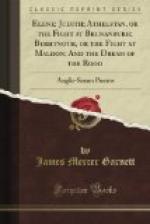There fierce was the fight: firmly they stood,
Warriors in war, the fighters fell,
Weary with wounds; fell corpses to earth.
Oswald and Ealdwald during all the while,
Both of the brothers, emboldened the warriors, 305
Their kinsman-friends bade they in words,
That they in need should there endure,
Unwaveringly their weapons use.
Byrhtwold [then] spake, uplifted his shield,—
Old comrade was he,—his spear he shook, 310
He very boldly exhorted the warriors:
“The braver shall thought be, the bolder the heart,
The more the mood,[23] as lessens our might.
Here lieth our lord, all hewn to pieces,
The good on the ground: ever may grieve 315
Who now from this war-play thinketh to wend.
I am old in years: hence will I not,
But here beside mine own dear lord,
So loved a man, I purpose to lie.”
So AEthelgar’s bairn them all emboldened, 320
Godric, to battle: oft let he his spear,
His war-spear wind amongst the wikings;
So ’midst the folk foremost he went,
Hewed he and felled, till in battle he lay;
This was not that Godric who fled from the fight. 325
* * * * * * * *
[1] Dear.
[2] Or, ‘maintained.’
[3] Bank.
[4] Bold.
[5] Destroy.
[6] Lit., ‘old.’
[7] Lit., ‘announce.’
[8] Money.
[9] Bank of the stream.
[10] i.e., ‘battle-array,’
Sw., but the word is uncertain; Kr.
suggests
‘fascines’; Zl. merely gives ‘Prunk.’
[11] i.e., Byrhtnoth.
[12] i.e., Byrhtnoth.
[13] i.e., the phalanx with interlocked shields.
[14] Some such word as grame,
or grimme, seems needed for
the
alliteration.
[15] i.e., battle-axes.
[16] Chamberlain.
[17] Inserted by Kr. to fill the
lacuna, whom W. follows;
Sw.
and Zl. omit.
[18] Lit., ‘suffer,’ ‘endure.’
[19] Lit., ‘bold.’
[20] Lit., ‘He was both my kinsman and my lord.’
[21] i.e., ‘sword.’
[22] i.e., ‘hollow shields.’
Cellod is found only here and
in
Finnsburg, 29.
[23] i.e., ‘courage.’




